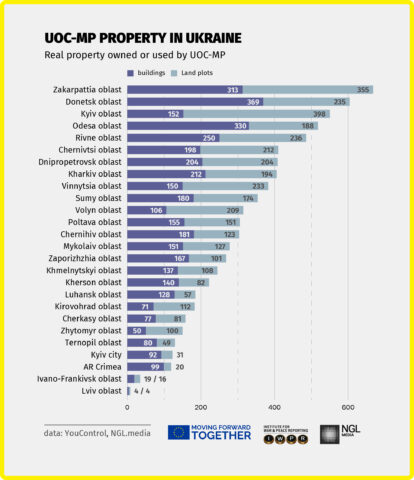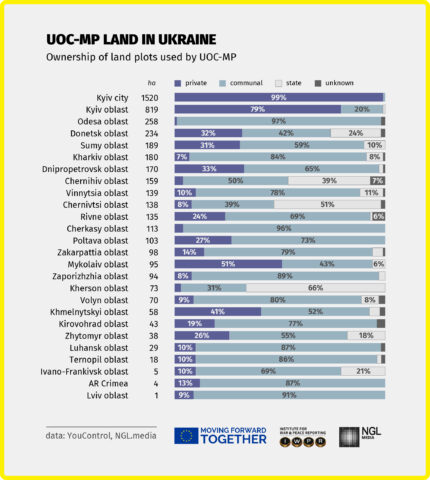Following the full-scale Russian invasion of Ukraine, numerous initiatives sprang up aiming at prohibiting the activity of the Ukrainian Orthodox Church (Moscow Patriarchate) which is regarded as the Russian influence network. Local authorities ever more often make decisions on banning the Ukrainian Orthodox Church (Moscow Patriarchate) in certain cities and even oblasts – however, such decisions are practically impossible to implement, according to lawyers.
A governmental draft law is being considered by the parliament. Its passing would launch a process of restraining UOC-MP activity on the governmental level. This draft law is regarded as quite lenient; it envisages lengthy and complicated procedure, but its passing would allow for ceasing functioning of Russian Federation related religious communities. Despite the fact the governmental draft law had been approved by the dedicated committee and All-Ukrainian Council of Churches and Religious Organizations, the parliament hasn’t pass it yet even in its first reading.
More than half of UkrainiansAccording to the research conducted by Razumkov Centre at the request of ZN.ua, 46% Ukrainians support total ban of UOC-MP; according to the data from Kyiv International Institute of Sociology, 54% of respondents support total ban. support the full ban of UOC-MP, and only less than 7% think that this church should act without any restrictions. At the same time, almost 60% support dispropriating UOC-MP of the property owned by the state or community.
Among the major problems with UOC-MP is the fact that this legal entity doesn’t exist. There are separate parishes, eparchies and so on, around 10,000 legal entities in total. In case their activity is banned, all of them will have to be taken to court.
However, UOC-MP, being the multitude of thousands of organizations, possesses not only its own property, but also state or communal property, rented or handed over for use. It’s the property that could easily be confiscated.
So, NGL.media together with YouControl gathered information about all the real estate property registered in the name of UOC-MP in Ukraine. All the data have been sourced from the state registers as of May 2023.
How did we do it?
First, we made a list of all organization having a word «orthodox» (in different forms) in their name, including registered religious communities. Following this, we singled out UOC-MP organizations, removing from the list all the other orthodox confessions and denominations.
We additionally compared the resulting list with the Ukrainian Orthodox churches register from Opendatabot and found out that some communities had already joined the Orthodox Church of Ukraine (OCU), but are still marked as UOC-MP in the Opendatabot register.
The process of transfer of UOC-MP to the OCU jurisdiction has been ongoing since 2019 when OCU received Tomos of autocephaly; however, it surged after the Russian invasion in 2022. As of early July, almost 1500 UOC-MP communities joined OCU (13% from the total number), but not all the communities made corresponding amendments to the state registers. There were cases of communities announcing their transfer to OCU and later giving up their intentions or acquiring an «independent» status.
We confirmed the list of active UOC-MP communities and organizations, taking into account the finer points mentioned above, and asked YouControl analysts to download the database of real property (land and buildings) registered in the UOC-MP name. It’s worthwhile mentioning that these data don’t include the property registered with private individuals connected with UOC-MP.
We brought all the property we found together in the joint database and mapped it out with links to the street addresses. Hovering over each single point, one can get information about presence and ownership of this property and see land plots boundaries or specific buildings. Use a map search or zoom to learn about UOC-MP property in certain location (oblast, district, city or village). The important thing is that for UOC-MP property in Crimea and occupied part of Luhansk and Donetsk oblasts we indicated only the items still registered under Ukrainian legislation.
We couldn’t map out some part of property, especially in rural area, as their addresses in the registers were outdated or inaccurate (for example, Lenina street), so it was difficult to find precise coordinates. That’s why we created another search field under the map, using which one can view a table with the complete list of property.
Search UOC-MP real property by keywords
| Property type | Address | Property user | Square, ha | Ownership |
|---|
This publication was prepared as a part of the Institute for War and Peace Reporting (IWPR) project with the financial support from the European Union. The publication contents is a sole responsibility of the editorial team and does not reflect the views of the European Union or the Institute for War and Peace Reporting



